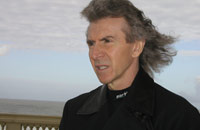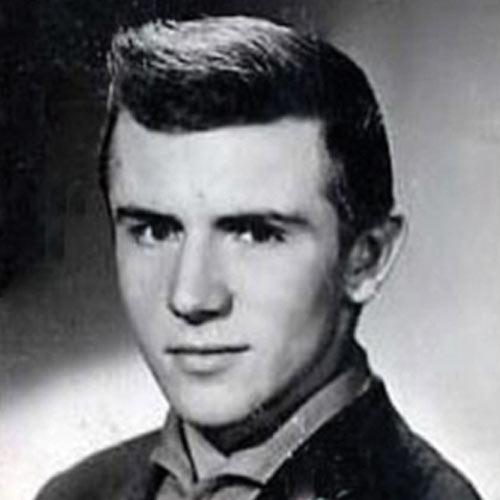
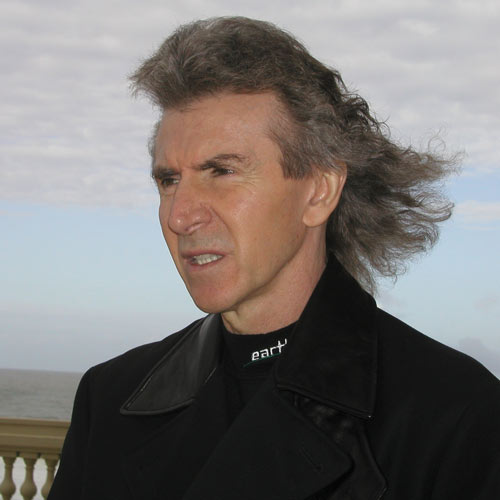
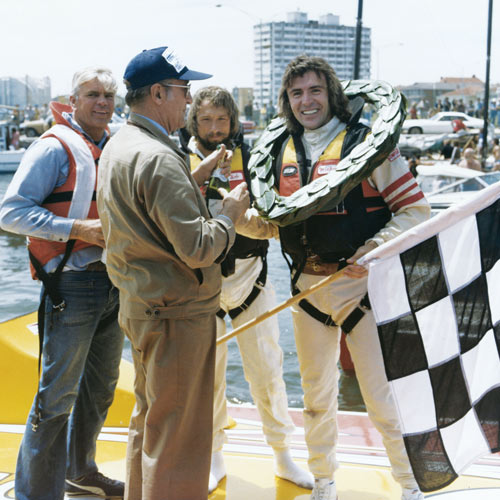
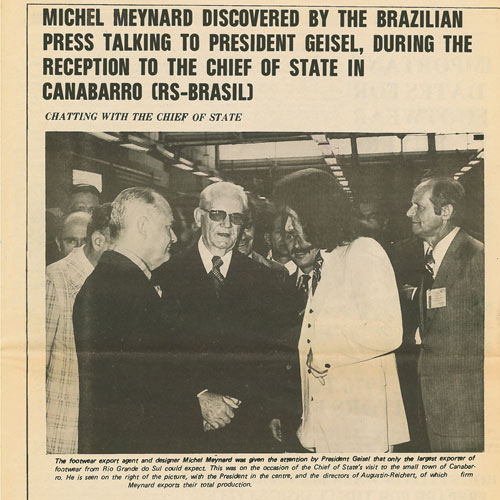
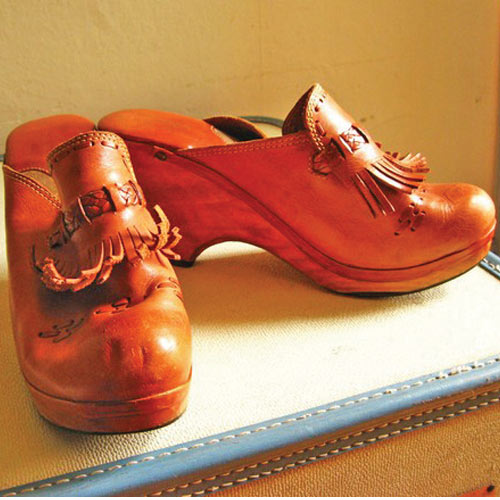

Industry icon Michel Meynard, founder of Meynard Designs and Earth Inc., leaves behind a career legacy full of firsts in the fields of design, sourcing and branding.
By Greg Dutter
Michel Meynard always did it his way. Driven. Determined. Daring. They are adjectives befitting a man who was an engineer by trade, a designer at heart and an entrepreneur through sheer determination and necessity. Meynard was one of the first to source footwear out of Brazil, beginning in the early ’70s, and, starting in the early ’90s, out of China, where his company still cranks out millions of pairs annually that are sold around the world. Meynard’s designs have helped put many names on the footwear map, including Fayva, Bakers, Bass and Wal-Mart, to name a few.
What made Meynard, the designer, so unique was his ability to create a broad range of product for an equally broad customer base. As Fred Kraft, DMM of Bon Ton, says, “Michel designed shoes for leading brands as well as for discounters who needed the price to come in under $20. And he could make all the shoes look great. That’s not easy to do.” Gary Champion, president of Earth Inc., cites Meynard’s extensive industry knowledge and almost clairvoyant ability to read fashion trends. “He knew the footwear market better than anyone I’ve ever known,” Champion says. “He could make a $500 shoe, a $100 shoe and a $29 shoe that would always incorporate some aspects of where the trends were going and be right on. He was brilliant at it.”
Danny Wasserman, owner of Tip Top Shoes in New York, says Meynard’s breadth of design ability stemmed from his good senses—specifically, his eyes and ears. “Michel was a listener and a watcher of fashion trends,” Wasserman says. “He was the person to go to for the large department stores when they needed shoes.”
Bob Infantino, president of Drydock Footwear and former head of Clarks in North America, describes Meynard as a rare blend of astute businessman, true shoemaker with knowledge of every step of the process and genuine artist. “I have never met anyone who possessed all those attributes in such abundance,” Infantino says. “He had style, he had common sense and he had courage. When Michel was in the room, you could feel his passion and his excitement for the business.” Infantino adds, “He stayed out of the limelight, but he was a force and will be missed.” Tarek Hassan, co-owner of The Tannery in Boston, says Meynard was an incredible shoemaker who taught him a great deal. “We would talk about shoes for hours,” Hassan says. “He knew how a shoe was made, where it was made and what it should be made of. There are only a handful of people in this industry with Michel’s breadth of knowledge and experience.”
First Steps
Meynard’s success in the footwear industry might never have happened if it hadn’t been for a chance meeting with a fellow Frenchman in a New England bar one evening in the late ’60s. At the time, Meynard was trying to make a go of it as a sales rep for a shoe machinery parts manufacturer. He was calling on area manufacturers, a task made all the more challenging due to the fact that Meynard spoke little English and his company gave little financial support to help him get the job done.He was staying in roadside motels, driving a cheap Chevy compact and doing his best to squeak out enough earnings to support himself and his family back in France. As fate would have it, the Frenchman who overheard Meynard speaking that night turned out to be a shoe industry exec. They struck up a conversation and quickly hit it off. He was a part owner of the French brand Trendsetters, and he mentioned that his partner was having some financial issues. The two exchanged information and, as far as Meynard believed, that was that. About four months later, however, Meynard received a call with an offer to manage Trendsetters. Meynard, 26 at the time, was completely caught off guard and unsure whether or not he could run a company. But there seemed to be no pot of gold waiting at the end of his current endeavors, so he accepted.
Little did he know that his new employer was looking into sourcing shoes out of Brazil. He soon found himself on a plane there to look for potential partners. Meynard also had no idea that Trendsetters would soon be sold to Wolverine Worldwide. During one of those early Brazilian sourcing expeditions Meynard came to two important realizations: 1. He didn’t want to work for someone else. 2. He wanted to design shoes. Shortly after, he met a Brazilian who soon became his business partner and together they launched their own shoe development agency. It would form the launching pad that skyrocketed Meynard into one of the industry’s most prolific designers, delivering him wealth and notoriety, including a formal greeting with the president of Brazil to acknowledge Meynard’s contributions to the country’s economy. Meynard had found his calling: Designer. And while his initial expectations might not have been to sell millions of pairs, his son, Phil Meynard, (now chairman of Earth Inc.), says his passion for footwear design made it the inevitable result. “Every breathing moment that my father was on the planet he was thinking about shoes, talking about shoes and working on shoes,” he says. “Even on the rare vacations he took, when traveling with my mom they would be visiting all the shoe stores in the various cities.”
Boom to Bust, Repeat
Meynard’s career trajectory was anything but linear. After his initial success spike, he was diagnosed with Hodgkin’s in 1981. He rushed back to the States for treatment and the prospects of survival were grim at the time. While undergoing extensive rounds of radiation and two years of chemotherapy, his partner ran off with the business, taking all of Meynard’s sketches, samples and contacts. “He was stuck in the hospital and couldn’t defend his business,” his son says. In order to be able to start a new business, Meynard had to sell nearly all of his possessions, including a Rolls-Royce that he had bought while undergoing treatment with the belief that his days were numbered. As his son recalls: “He always wanted a Rolls-Royce. But, being my dad, with his love of fast cars, he took it to a custom shop and had massive race wheels put on to make it a ‘hot rod Rolls-Royce.’”
Meynard couldn’t hold on to his hot wheels, but he did win his bout with cancer and rebuilt a Brazilian-based private label business. In the years just before his illness, his need for speed also took the form of powerboat racing. (Meynard flew helicopters as well.) The hobby quickly grew into an obsession, and Meynard became a world champion in offshore racing in 1980. But the following year a spectacular accident put an end to his racing career. (A video of the crash has become an Internet legend.) While he escaped serious injury, it was a close enough call that Meynard’s wife sank his hobby. He had named his boat Fayva Shoes after the Morse Shoe chain that sold his wildly successful burnished wood clog design. In just two years, 18 million pairs were exported. Meynard had the clogs stained with sponges and brushes by hand. He dubbed the effect “Latigo” (the vanity license plate on his car) that became an industry term.
Refocused on designing and sourcing shoes, Meynard came to another sharp career detour in the late ’80s. Due to a Brazilian currency crisis, the ability to make shoes affordably ended. Meynard hung on for as long as he could, but in order to survive he had to look elsewhere. The first stop was Taiwan. Meynard and a partner got the business up and running, but, believe it or not, that person also fled with their business plan. Meynard once again had to, as his son describes, “sell everything” and start from scratch. This time he moved to China. The operation soon flourished and, to this day, employs thousands in a state-of-the-art facility that makes millions of pairs annually.
Meynard’s ability to rebuild a company from ground zero—repeatedly—reflects his steely determination. His son says he was relentless and fearless. “He never stopped. And he was never afraid to put it all on the line,” Phil says. “Most people are afraid to take everything they own and lay it on the line. He wasn’t.”
Meynard’s approach to design was similarly determined. He worked primarily on a “love it or hate it” premise. Not surprisingly, when it came to discussing his designs, his opinions were often strong. “When he was convinced of an idea he would take it to completion no matter what anybody said around him,” his son says. Even when dealing with major accounts like Wal-Mart, where millions of pairs could be at stake, Meynard would stick to his convictions. “If they disagreed, he’d basically say, ‘You’re out of your (expletive) mind,’” Phil says with a chuckle now. “Nine times out of ten, he would win the argument. But he was willing to take that gamble because he believed so much in his designs.”
In addition to being a passionate designer, Meynard was gracious and generous. “He would give me a hug and a kiss whenever I saw him,” Kraft says. “He was a charming man who invited me into his home often.” Sam Hassan, co-owner of The Tannery, echoes those sentiments: “Michel was an incredible shoemaker, but more importantly we enjoyed a close personal friendship for years. Our industry has lost a wonderful man.” Meynard was also incredibly loyal. In fact, the bank that gave Meynard his first loan to source shoes in Brazil is the same one the company does business with four decades later, though the name has changed a few times.
Leaving His Mark
If Meynard had any regrets in his storied career, it was not starting on his last venture sooner. Rather than put all his efforts into making designs for others, he and his son acquired the rights to the then-defunct Earth brand in about 2000, with the goal of building it into a global lifestyle powerhouse. They began by reintroducing the brand’s iconic negative heel in updated styles. While nearly 25 years had elapsed since its heyday, Earth still possessed a cult following that swore by its comfort and wellness attributes, namely improved body alignment. Several years later, they launched Earthies, an innovative comfort-based construction featuring heels. It freed Meynard from the negative heel’s design constraints and allowed him to push the creative envelope once again.
“Earthies came out of nowhere. In just two years, it has become one of our top-selling brands, doing more than $400,000 at cost this year,” says Gary Hauss, owner of the J. Stephens chain based in California. “The colors, materials and constructions are a completely fashionable look while also including all the necessary elements to make it a true comfort product.”
Kraft of Bon Ton says both Earth and Earthies have gained traction. “Even though Earth is a comfort brand, Michel lent a fashion perspective,” he says. “That’s why we have fallen in love with what he was doing. We’re in Earth in a significant manner and Earthies in a smaller way, and both are doing very well.”
In a sense, Meynard’s vision for Earth Inc. was just beginning to take off. He was on the verge of another career spike when cancer returned and, during treatment, he succumbed. He was 73. But, according to Champion, the company has been left in the best of hands and poised to fulfill Meynard’s vision. “We’re starting to take hold and I’m glad he got to see that before he lost the battle,” he says. “Our goal is to fulfill Michel’s dream.”
Well Said
When it came to the shoe business, Michel Meynard had a good answer—for nearly everything.
In the January 2009 issue of Footwear Plus, Michel Meynard was the subject of the Q&A feature. In the interview, Meynard talked extensively about his career, design philosophy and vision for Earth, Inc. He was candid, insightful and, at times, refreshingly blunt.
Having done hundreds of such interviews over the past 15 years with executives across the footwear spectrum, what stood out with respect to Meynard—in addition to his engaging French accent—was his breadth of industry experience and knowledge. I’ve interviewed my share of marketing visionaries, product geniuses, number crunchers and great motivators, but rarely has a subject possessed all those qualities to the extent that Meynard did. By the time we finished speaking, I felt like I had just completed a tutorial on the art of shoemaking. I had also gotten to know the man who was at the forefront of this field for the past four decades. Meynard had all the right answers. But throughout the conversation, he was modest, witty, funny and frank. Above all, he was honest. It was a delightful two-hour conversation.
Below are some memorable quotes from that interview. —G.D.
“I’m a shoe guy. When I see a retailer look at my shoes and react with a huge smile…that’s what makes me happy. It’s not about saying my company is bigger than someone else’s. I passed that stage a long time ago.”
“Design is something that has to be desirable. In tough times, you may not buy as much, you may not buy top of the line—but if it looks really great, then you are going to do everything you can to buy that product.”
“Design should be based on whether you love it or hate it and not a compromise.”
“Insole and last making are the keys to any good footwear.”
“Style for style is not the way I see the shoe business. Whatever you do, it should be something that is technically correct.”
“We are a solid, family-owned business that believes in offering something the customer can trust. We don’t tell any B.S. stories.”
“Wellness can be defined as feeling good, but it can also be defined as being good for the planet. Wellness also involves human rights issues.”
“Business has never been easy. It was tough years ago, it is tough today and it will be tough 20 years from now.”
“I tried to retire several years ago but thought, ‘What the hell am I going to do?’ Every day I am happy to go to work.”

